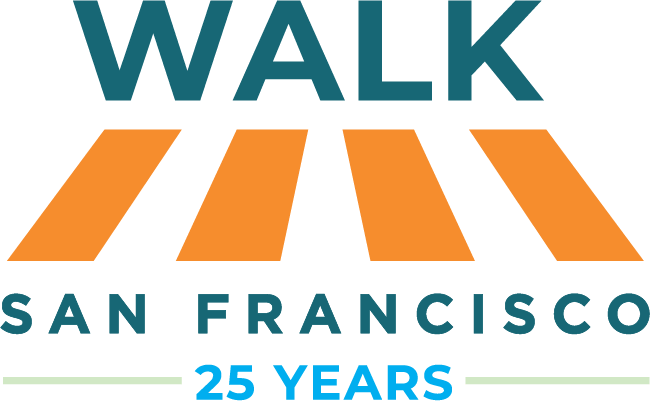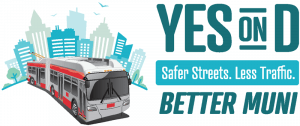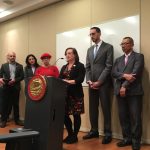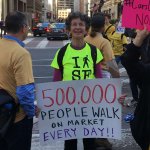Vote YES on Prop D, the ‘Uber and Lyft tax’ to fund safe streets and better transit in San Francisco
Proposition D addresses some of the impacts of Uber and Lyft on our streets; we need your help for it to pass!
There are thousands more vehicles on our streets today because of ride-hailing companies Uber and Lyft; on a typical weekday, ride-hail vehicles make more than 170,000 vehicle trips within San Francisco. This is taking a toll on our safety and our city.
On the November 5, 2019 ballot, San Francisco voters have a chance to establish a business tax on Uber and Lyft. The tax will go straight toward funding better public transportation as well as projects that make it safer for people to walk and bike.
Proposition D has a long list of endorsements, including from Walk San Francisco. We strongly urge you to vote YES on Prop D.
Read on to learn how the tax will work and why your support is so important.
Three ways Uber and Lyft are taking a toll on our safety and our city
1. Congestion. Uber and Lyft are responsible for 50% of the increase in traffic congestion on our streets in recent years. This slows all vehicles, including Muni buses.
2. Dangerous conditions for pedestrians. The more vehicles that drive on our streets, the greater the risk is for people walking. It’s that simple.
But we also know some Uber and Lyft drivers aren’t always the safest drivers. This is reflected in SF Police Department records in terms of traffic violations, and we all have witnessed this firsthand. Some Uber and Lyft drivers speed to pick up passengers in order to earn bonuses so they can make enough on their shift. Some Uber and Lyft drivers are exhausted from driving long shifts. And an estimated 71% of drivers come from outside San Francisco, so don’t necessarily know how to navigate our complicated streets.
3. Hurting our public transportation (plus our climate goals). Yes, Uber and Lyft are convenient, but at what cost to our broader transportation and climate goals?
Our buses and trains are the most efficient, climate-friendly vehicles people can get around in. But Uber and Lyft have reduced bus ridership in San Francisco by an estimated 12.7% since entering the market in 2010. Of course that’s also a hit to Muni’s revenues, which means less funds to improve transit service.
Plus, vehicles are often circling with no passengers, congesting and polluting pointlessly. An estimated 20% of the miles traveled by Uber and Lyft drivers in San Francisco are without passengers!
A small tax on Uber and Lyft rides would fund safer streets and better transit
Prop D would add a tax on all Uber and Lyft rides within San Francisco (or any miles of a trip that takes place in San Francisco) which will directly fund better public transportation as well as projects that make it safer for people to walk and bike.
The tax will total only $0.10 to $0.20 for a shared ride (like UberPool), and about $0.40 to $0.60 for a more typical solo ride in an Uber or Lyft vehicle. Specifically, it’s a 3.25% charge to each individual ride, and a 1.5% charge for shared rides or rides in zero-emission vehicles.
While this tax is small, it is estimated to raise about $30 million every year in much-needed funds for: 1) public transportation and 2) to fix the city’s most dangerous streets.
More specifically, half of the funds will go to the SF Municipal Transportation Agency (SFMTA) to hire more Muni drivers and buy more buses and trains. The other half of the funds will be designated for Vision Zero walking and biking safety projects, to be managed by the San Francisco County Transportation Authority (SFCTA).
It’s the much-needed funds for Vision Zero projects that Walk San Francisco is especially enthusiastic about. This is money to redesign the most dangerous streets. The City is making progress on fixing the “high-injury network,” the 13% of San Francisco streets where 75% of traffic crashes happen. But over 50% of the streets the high-injury network have yet to receive any safety improvements, and the City has major funding gaps as identified by the Transportation Task Force 2045. Yet we need these projects now to save lives.
What kinds of Vision Zero pedestrian safety projects are we talking about? These are things like raised crosswalks, curb extensions (called ‘bulbouts’), traffic signals that let pedestrians start walking before traffic starts, and traffic calming tools (like strategically-placed posts, paint, and rubber bumpers) to slow vehicles and make pedestrians more visible and protected. These are highly effective, proven ways to design streets for pedestrian safety.
Other major cities already have established taxes like Proposition D
Other major cities already have fees and taxes on Uber and Lyft. Chicago, Portland, Philadelphia, Washington, D.C., and Seattle all have per-trip fees or percentage of total fare taxes. The entire state of Massachusetts has a $0.20 per-trip fee. New York has a 4% tax on trips that begin outside of New York City.
We really need your help to pass Prop D
Despite the long list of endorsements of Proposition D, the campaign itself is relatively under-the-radar for voters right now. And Prop D is a tax, so it requires a two-thirds vote to pass. So we really need your help!
- Vote for Prop D today: early voting starts October 7; voter registration closes October 21; Election Day is November 5
- Spread the word to everyone you know in San Francisco. Here’s a sample email you can send and a logo to use on social media. #YesOnD #SaferStreetsBetterTransit
- Sign up to volunteer at upcoming events like farmers’ markets and busy transit stops to talk with voters
- Stop by our office during business hours to pick up your Yes on Prop D sign
- Donate to Walk San Francisco to boost our work to win more funding for safe streets!
We’re going need to act quickly to get the word out on Prop D, so thank you for anything and everything you can do to get us to a big win on Election Day!
Sources: TNCs & Congestion, San Francisco County Transportation Authority; Understanding the Recent Transit Ridership Decline in Major US Cities: Service Cuts or 2 Emerging Modes? University of Kentucky; The TNC Regulatory Landscape, San Francisco County Transportation Authority; Eno Brief: Taxing New Mobility Services: What’s Right? What’s Next, Eno Foundation; SF Transportation Task Force 2045
Banner image: SFMTA Photo Dept.





